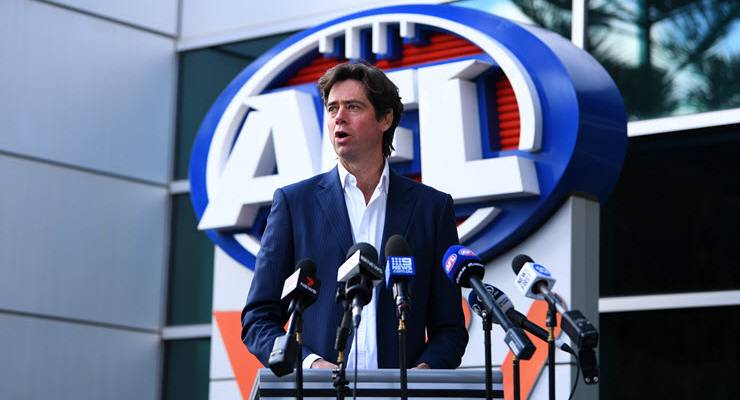
Another “record” AFL broadcast rights deal was confirmed yesterday with outgoing AFL CEO Gillon McLachlan confirming that Seven and Foxtel will spend $642 million annually over seven years.
The previous two deals had generated $3.5 billion over eight years.
Cue widespread praise and adulation from a complicit media that inevitably fail to show the barest understanding of the true implications of ever-inflating broadcast deals.
There certainly are winners from the deal, and McLachlan has once again shown to be a supremely talented negotiator — he has had probably the most successful tenure as head of Australia’s richest sporting code (his calming presence was a significant improvement on the reign of his somewhat tarnished predecessor Andrew Demetriou).
The deal will ensure that AFL bosses continue to be some of the highest paid executives in the country — in 2019, the AFL’s 12-person executive team shared $10.6 million, which will certainly materially increase now. AFL players and club bosses will also earn far more (the “soft cap” that clubs can spend will increase) and the AFL will continue to invest in excellent programs such as Auskick and AFLW, especially in growth markets such as NSW and Queensland.
The key step-change in AFL rights came way back in 2002 — the year when the entire rights were removed from free-to-air TV and shared between Nine, Ten and Foxtel for the first time. The AFL’s annual take leapt in 2002 from $40 million to $100 million. This was straight out of the Murdoch playbook that was executed so brilliantly in the US and UK (British Sky Broadcasting was a struggling satellite provider until winning its shock Premier League rights in 1992).

Although the AFL’s broadcast revenue has grown significantly in raw terms since then, the 2002 deal stands out as a watershed moment. The losers from all this largesse have been AFL supporters.
The dirty secret of sport (apparently obvious to all except actual sports writers) is that broadcast deals are simply a way of laundering more cash from fans. Subscription TV services (whether cable or broadcaster video on demand) are simply the mechanism to achieve that.
Before 2002, AFL fans could watch every game their team played essentially for free, albeit with an indirect cost borne by consumers when they buy the advertised products. While not as bad as Premier League, which shows almost no games for free, the AFL essentially forces genuine supporters to purchase a Foxtel or Kayo subscription. While the cheaper Kayo has reduced that supporter tax significantly in recent years (a supporter can pay for six months of Kayo for about $160 compared with about $350 for six months of Fox Sport), the tax remains.
The AFL chose to ignore Ten/Paramount’s $6 billion (10-year) pitch, which would have broadcast games free to air every Saturday night in the flailing Queensland and NSW markets. Under the Seven/Foxtel deal, NSW and Queensland fans will also be forced to watch games on a 120-minute delay, a strange way for the AFL to prioritise a so-called growth market.
Viewers in South Australia and Western Australia will be forced to watch 12 games annually on a two-hour delay (up from three now). Also as part of the deal, Thursday night games — hated by those wanting to attend games but loved by TV audiences — will continue to grow to 15 annually.
In one sense, the steep inflation in rights from the AFL is a potential hedge as inflation starts cutting into household discretionary spending (or it’s exceedingly foolish). All sporting organisations have been beneficiaries of the multi-decade everything bubble — if consumers decide to start cutting their discretionary spend, they may well opt to invest in a Kayo subscription rather than attend more expensive AFL matches.
Make no mistake, the new AFL rights deal is another big win for executives and players who will share in billions of dollars of windfall gains, and another loss for ordinary AFL fans who have long stopped being relevant stakeholders in the game they fund.
Is this a crook deal for you? Let us know your thoughts by writing to letters@crikey.com.au. Please include your full name to be considered for publication. We reserve the right to edit for length and clarity.








Crikey is committed to hosting lively discussions. Help us keep the conversation useful, interesting and welcoming. We aim to publish comments quickly in the interest of promoting robust conversation, but we’re a small team and we deploy filters to protect against legal risk. Occasionally your comment may be held up while we review, but we’re working as fast as we can to keep the conversation rolling.
The Crikey comment section is members-only content. Please subscribe to leave a comment.
The Crikey comment section is members-only content. Please login to leave a comment.